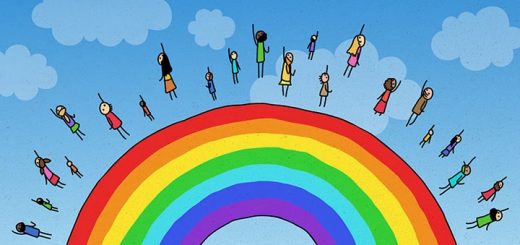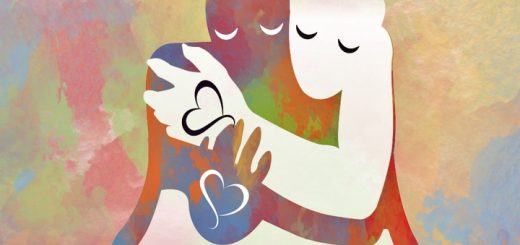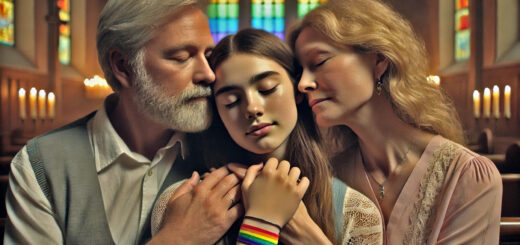As my father has reconciled his love for God and for his gay son. His inner struggle
Article by Timothy White* Published on the De website The New York Times (USA) on February 5, 2025, freely translated by Diego deLa Tenda di Gionata. Second part.
Read first part.
From my father's diary. May 30, 2015: Timothy is 15 years old.
I feel frustrated, father. The scriptures no longer seem so clear and this is a big problem, with enormous risks. What should we do in this case of a great problem, without clarity? On the one hand I hear: «As far as we know, we are right and we feel reinvigorated by our sacrificial commitment to the Lord.
But we are really alone, sad and somehow repressed, and we wonder if we are losing a huge part of the life that Jesus would have for us. Not to mention the fact that it seems that we are closing the door of the Gospel both to LGBT people and the younger generations ».
I hear the other part say: "As far as we know, we are right and we finally feel free from all the sense of guilt, the solitude and repression we have suffered, but sometimes we still ask ourselves if we are immoral". Neither sides seems completely satisfied or convinced. And neither is completely convincing. And the stakes are very high.
4th July 2015
I am sad because I don't feel like having been a quite good father to prevent Timothy from being gay. In fact, I am angry for this, father. I am angry because I did everything well and you didn't keep your part of the agreement. I was the exact opposite of the distant father and he still became gay: that's not how he had to go.
25 July 2015
I am realizing that I am still very sad for Timothy. I don't like to share this with many people because it doesn't seem to me a safe thing: if they don't like me, well, I'm afraid they will try to fix me, to correct me, or that they will take it as a confirmation of their opinions on sexual morality.
September 5, 2015
My theology is changing, father. It has been a deep background for a couple of years, but is emerging in new ways and with real power these days. I think there are two main things that nervous me.
The first is that I can't read the scriptures anymore. There is a pinch of doubt, of distrust, of skepticism when I read. How do I know that what is written there comes to you? How do I separate the human contribution? I am reading the Scriptures differently, with a margin.
The second area that nervous me concerns morality. If I can get to the point where homosexuality is moral, how much does the rest of my morale change? Of course, I had the conversation with Timothy in which I told him that I appreciate the purity and that I would like him to reserve sex for marriage.
It was a somewhat strange conversation, because how do I get to the point of "no sexual relationship before marriage" but then redefine the marriage? At what point do my sexual costumes change? And the morality of the swear words? Of generosity? Of lies? How much things become situational? How open are the scriptures to the reinterpretation on these things? And what about universalism, paradise and hell?
Jesus, I want to reflect seriously on what it means to cling to me, to meet you, love you and build my theology on you and not on the scriptures.
When I think back to those years, I did not know the extent of the inner struggle that my father ** was fighting at that time, but I knew something was happening.
As an evangelical shepherd formed in a conservative religious tradition in the middle of the cultural wars of the 90s, my father has spent decades to spread the good short story of Jesus Christ. As children, my sister and I joked about the fact that she never went anywhere without taking an invitation ticket to a religious function with it; He was always ready to talk to someone sitting next to him on a plane or in line to civil motorization, of what worried him and how Jesus could offer hope.
He did not speak much of homosexuality or other burning social issues, but he was an inevitable background: he preached that Jesus offered redemption and grace from the sins of the world, a list that began with violence, greed and dishonesty, but he never failed to include sex on the outside a "Christian" wedding between a man and a woman.
These evangelical teachings were the air that breathed, the water in which it swimped. So, when difficult questions began to ask them, even if I was not reading these notes, I could feel that part of the foundations of our family were giving in.
He began to speak at the table of how the primitive Church had had serious internal disagreements on theology. I remember having heard him speak for the first time of gay people he was meeting and with whom he was making knowledge: as gay Christians who sat in church with their romantic partners to gay Christians who felt called to the celibacy by the principles of their faith.
From my father's diary. September 8, 2015
I thought a lot about Paul and how it passed by the law to Jesus, he really did a reversal. And now he says crazy things like: «The only thing that matters is the faith that is expressed through love (Galati 5: 6) and anyone who loves others has fulfilled the law (Romans 13: 8) and love is The fulfillment of the law (Romans 13:10) and the entire law is fulfilled by observing this single commandment: love your neighbor as yourself (Galatians 5:14) ». Paolo really wants to go on to the fundamental message and let many of the other "rules" lose. Father, how do I do it despite still having a sexual ethics, for example?
Some of the things I read speak of "biblicalism" or "foundationalism", which both seem to describe what I am leaving. Life, morality, God and religion were much clearer then how they are now. Yet the strange thing is that I have never felt closer to Jesus, more intimate, more interested, more willing to sacrifice myself for him and more free to be Christian.
In reality it is quite frightening, because people will judge me, Christians will proclaim that I have lost faith and I will lose some privileges I had in the community. They will not ask me to celebrate weddings or to speak in some churches or events, etc., above all because I make myself more and more account than those who are leading me to be. The LGBT issue will continue to be a paneting, but they are the understanding of the scriptures and the issues of the second half of the life they are really working. Father, have mercy on me. Help me to be only kind, believer and loving. I don't want to have great projects for others. I just want to follow you and help others do the same.
At the beginning of 2016, in my father's diaries there was less anguish towards me: I had done coming out And he had been loving and solidarity throughout the time. What remained very unstable, however, was the relationship between its theology and homosexuality.
For a shepherd it is no small thing: he influenced not only his personal faith, but also the way he faced life and his livelihood. He had implications for our relationship: if I got married, would he have celebrated my marriage? But he also had implications for the large community of people who had found a house in our church.
Around 2013, my father left his work as a shepherd in a large evangelical church of a few thousand faithful to found a new church, the City Church Long Beach, which met in our courtyard with the aim of promoting a more authentic and popular community. The church has grown from a few families to a couple of hundreds of people in the local school auditorium.
Until then, the process of change of opinion had been most private, between his conscience and God; But as my father had anticipated in his previous diaries, he would not have remained such for a long time. Changing your mind in private is one thing; Changing the idea publicly is very different.
When I did coming out, some sisters of our moderately conservative denomination were publicly discussing the possibility of officiating gay marriages and having LGBTQ+ people in leadership positions. These issues were in the air; my coming out gave a face to the question.
And so our Church, on my father's initiative, started our official process of open discussion on faith, sexuality and genre, bringing together a group of leader of the congregation to study and define the policies of the Church.
The group had a series of theological points of view and was busy starting the process without a predetermined conclusion. They proposed to learn, not only by reading theology books together with biblical texts, but also from each other and the community.
My father, who has always been a reader and a scholar, was enthusiastic. Seen from the outside, the study group could seem like a small or bureaucratic step. And he did not move quickly, taking almost two years to get to a decision.
But for a church rooted in American evangelism, it publicly committed to seriously considering gay people was an epochal step: even the announcement of the study group aroused a sensation in the congregation and my father began to receive e-mails and angry calls.
*Timothy White works in the field of political communication. While he was at college, he was president of a student organization for Christians LGBTQ+. Attend theCity Church by Long Beachin California.
** Bill White has been a shepherd for twenty-five years and co-bearer of the City Church Long Beach for 12 years. Has co-founded and directs the organizationSmall church big table, which helps religious leaders who are thinking about LGBTQ+questions.
Original text:How My Dad Reconciled His God and his gay are






